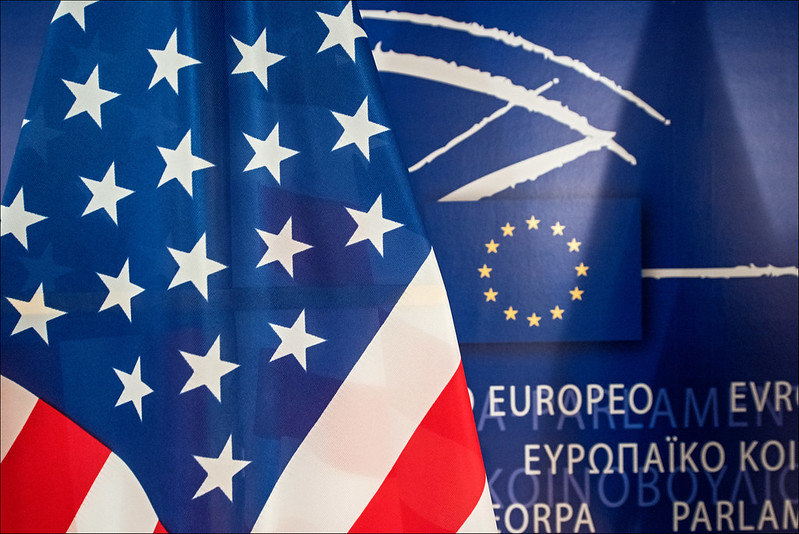The EU-US summit showed climate change has regained its place in the transatlantic dialogue but concrete steps to progress climate action were missing. EU-US climate diplomacy could bolster negotiations in Glasgow this November if they can coordinate and deliver equitable, science-based policy and action.
Key outcomes from this month’s Brussels summit include :
- Consensus on values and priorities from foreign policy and security to climate action and vaccine access.
- A five-year truce on the large aircraft trade dispute, defusing tensions and signalling a possible easing of protectionist trade policies.
- Five new working groups to renew and revitalize the transatlantic partnership, two of which are explicitly climate focused.
The EU-US summit missed opportunities for definitive progress on climate finance pledges, committing to a coal-exit timeline, and phasing out the sale of combustion engine vehicles. Progress would have established higher expectations for COP26, as well as back up US efforts to reclaim a leadership role on global climate action. Nonetheless, differences are not insurmountable, and there is reason to believe that both sides are genuinely committed to ambitious climate action.
Contentious topics like carbon leakage, carbon pricing, and the TRIPS waiver were casually mentioned as if there was not an ocean separating the two sides on these issues. The summit took pains to avoid diverging interpretations by having a one-party press conference by the EU and the US staying silent except for the joint statement. This is a perfectly justified means to ensure maximum cohesion, but a formal read-out from the Biden administration might have bolstered confidence in the newfound American climate ambition. The little official information issued by Washington came via a background pre-summit press call and offered only sparse information on climate. The only EU-US stage-sharing moments were from the welcome and plenary statements focused on the shared joy of reunion rather than the urgency of the crisis.
Substantively, the EU-US summit produced a five-year truce on the Boeing-Airbus dispute, which will have more political than climate benefits. Perhaps the most promising development was the creation of five new working groups:
- Steel and aluminium working group, tasked to resolve ongoing tariff disputes.
- Climate Action Group, representing a high-level initiative to address carbon leakage and define green investment.
- Transatlantic Green Technology Alliance, seeking to enable breakthrough technologies and bring them rapidly to market.
- EU-US Trade and Technology Council, focusing on new technologies, supply chain resilience, and trade.
- EU-US Vaccine Task Force, protecting supply chains for vaccines and therapeutics, increasing production, and de-risking private investment.
Though not all relating to climate action in name, all play a major role in shoring up confidence that countries can cooperate on decarbonizing our economies by 2050. Provided they succeed in delivering real results, the EU-US will be well-placed to build the ecosystem we need for a global net zero economy. These taskforces must not become mere talking shops or just kick the can down the road.
What stood out – and where the differences can be felt – was the inability of the summit to deliver on two crucial points where the G7 also failed to find answers.
First, the lack of firm pledges to reach $100bn for climate finance when either side could shoulder the sum unilaterally. Instead, the summit came up with a vague promise of increased climate diplomacy for an ambitious COP26. This would have been a great starting point a year ago but is far from what it takes to ensure a win in Glasgow.
Second, with both the EU and US clearly phasing out coal for both economic and climate reasons, they remain unwilling to set a timeline, ambitious or not. Without such a date, it will be harder to pressure other major emitters into phasing out coal.
Because of these omissions, the EU-US summit did not bolster optimism for the kind of commitment needed at COP26. To enable global climate action, the EU and US must:
- Announce a concrete plan how to deliver $100bn before the UN General Assembly in September;
- Deliver a meaningful solidarity package for vulnerable countries, identifying substantial resources to expand fiscal space, accelerate the energy transition, boosting adaptation and resilience to future economic shocks; and
- Commit to phasing out fossil energy at home and abroad by set timelines.
The summit showed the world that the EU and US are teaming up again to address global challenges with the climate crisis at the forefront of their relationship. To restrict warming to 1.5 degrees Celsius, that relationship needs to be founded on honest, ambitious and science-based collaboration, rather than strategic diplomacy. The June summit only got us halfway there. We have a ways to go.


